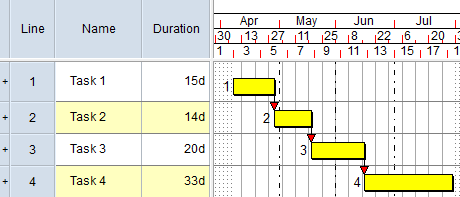'Detail' quality metric
Use the 'detail' metric to check the proportion of tasks in a project that have a duration shorter than a given duration. A high proportion of tasks with long durations can indicate insufficient detail in planning and poor schedule definition. Milestones are excluded from this metric.
With the duration set to 44 days and the pass and fail boundaries set to 100.00%, this metric meets the requirements of CIOB stress test 8 (Long durations). With the duration set to 44 days and the pass and fail boundaries set to 95.00%, this metric meets the requirements of DCMA test 8 (High duration).
In the following illustration, tasks 1, 3 and 4 have durations of 25d, 20d and 33d respectively. If 15d was the given duration in the settings of this quality metric, these tasks would be considered to be over-long and would fail this metric:

You can change the impact that this metric has on the weighted total result of a quality check by entering a factor by which the quality metric should be multiplied in the Weighting field. For the weighting to have any effect, a quality check must have more than one quality metric.
Pass and fail criteria
| Pass or fail? | Criteria |
|---|---|
| Pass |
A project passes this metric if the percentage of tasks that are shorter than the given duration is greater than or equal to the pass boundary percentage.
For example, if the duration was set to 15d and the pass boundary was set to 50.00%, a project would pass this metric if 50.00% or more of tasks had a duration of less than 15d. |
| Fail |
A project fails this metric if the percentage of tasks that are shorter than the given duration is less than the fail boundary percentage.
For example, if the duration was set to 15d and the fail boundary was set to 50.00%, a project would fail this metric if less than 50.00% of tasks had a duration of less than 15d. |
| Neither pass nor fail | If the percentage of tasks that are shorter than the given duration falls between the pass and fail boundary percentages, the result is neither a pass nor a fail, but somewhere in between. |
Default suggested settings
- Duration: 15d.
- Pass boundary: 50.00%. A project will pass this metric if 50.00% or more of tasks have a duration of less than 15d.
- Fail boundary: 50.00%. A project will fail this metric if less than 50.00% of tasks have a duration of less than 15d.
The following table shows whether some example projects would pass or fail this metric using these settings:
| Percentage of tasks with a duration of less than 15d | Pass or fail? |
|---|---|
| 0.00% | Fail |
| 25.00% | Fail |
| 49.99% | Fail |
| 50.00% | Pass |
| 75.00% | Pass |
| 100.00% | Pass |
Suggested settings to meet the requirements of CIOB stress test 8 (Long durations)
- Duration: 44d.
- Pass boundary: 100.00%. A project will pass this metric if all tasks have a duration of less than 44d.
- Fail boundary: 100.00%. A project will fail this metric if any tasks have a duration greater than or equal to 44d.
The following table shows whether some example projects would pass or fail this metric using these settings:
| Percentage of tasks with a duration of less than 44d | Pass or fail? |
|---|---|
| 0.00% | Fail |
| 50.00% | Fail |
| 99.99% | Fail |
| 100.00% | Pass |
Suggested settings to meet the requirements of DCMA test 8 (High duration)
- Duration: 44d.
- Pass boundary: 95.00%. A project will pass this metric if 95.00% or more of tasks have a duration of less than 44d.
- Fail boundary: 95.00%. A project will fail this metric if less than 95.00% of tasks have a duration of less than 44d.
The following table shows whether some example projects would pass or fail this metric using these settings:
| Percentage of tasks with a duration of less than 44d | Pass or fail? |
|---|---|
| 0.00% | Fail |
| 50.00% | Fail |
| 94.99% | Fail |
| 95.00% | Pass |
| 97.00% | Pass |
| 100.00% | Pass |
Does the metric force a project to be rescheduled?
No.
Suggested actions if a project fails this metric
If a project fails this metric, select the metric in the Quality Check Results dialog and click Show Failing Tasks to view the tasks that have failed the metric.
You could take the following actions to remedy the failing tasks:
- Split over-long tasks into smaller sub-tasks that represent discrete activities.
- Turn over-long tasks into summary tasks and create smaller sub-tasks that represent discrete activities within the summary group.
Introduction to schedule quality checking
Identifying activities or tasks